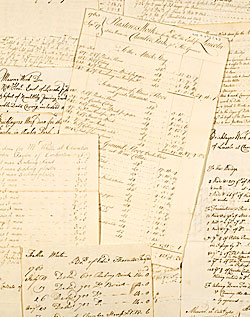What can they tell us?

Bundle of bills and vouchers for building works at Clumber Park, Nottinghamshire, 1763 (Ne A 673)
Accounts and other financial records are among the categories of historical record which have survived in the greatest numbers. They range across all dates, and can illuminate the financial position of all kinds of people and organisations. Accounting records can be of particular interest and use in research into the following areas:
Business history
Account books, ledgers and balance sheets help to tell the financial story of businesses and their customers. Researchers might be frustrated by gaps in the records, because it is unusual for complete runs of accounts to have survived. This is especially true if the company went out of business or was taken over by another. However, in many cases accounts were the only records of the company which were not lost or destroyed.
Bills and invoices sent out to customers in the nineteenth century were often illustrated with detailed pictures of the business's products or premises. Such illustrations can be of interest to art historians and social historians, as well as historians of the business itself.
Agricultural, local and community history
Accounts from landed estates and manors can go back as far as the Middle Ages. Before the advent of double-entry book-keeping, many estate accounts were written in an idiosyncratic way which can reveal interesting details which might not be expected in an account.
For instance, much of the Portland (London) archive is concerned with mineral rights of the Dukes of Portland and their predecessors in Nottinghamshire, Derbyshire and Northumberland. One account (Pl C 2/322) relates to the cost of setting up Black Close Colliery in Northumberland in the 1730s. Digging for coal was a speculative and financially risky business, and this colliery seems to have been abandoned after only thirty years. There are not many records relating to the colliery still in existence, but this Charge and Discharge account gives many details of exactly when and how the colliery was sunk and developed, and why the costs were as they were - the kind of information that other writers might have put in a letter.
Estate accounts are often bound up with rentals, allowing researchers to see the names of the tenants and gain an idea of the size of their landholdings. Landed estates also employed tradesmen and craftsmen from the local area to undertake work. Many of these people are named in estate accounts.
Taxation records were usually based on the parish. Together with other records, they can be used to try to reconstruct patterns of landowning and the relative wealth of households, either at fixed points in time or over the course of the years.
Biography and Family History
Personal accounts and bills can reveal fascinating details about what people wore, what they ate, where they holidayed, what furniture and household items they bought, and how much debt they were in.
Researchers looking into the history of a family known to have lived in a particular parish over a number of years could try looking at manorial or estate accounts and taxation records from the area. It might be possible to find references to the family members, find out what jobs they did, and even get an idea of what kind of house they lived in.
Business records can also reveal details about their employees. If personnel records have not survived, entries in wages accounts could prove that an individual worked for the company, and provide some information about their position and status.
History of accounting
Historians of accounting as a discipline will find a vast array of primary sources for their research in the financial records and accounts preserved in archives and record offices.
Next page: Glossary